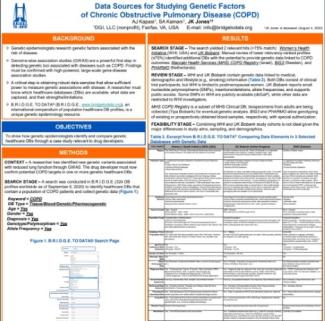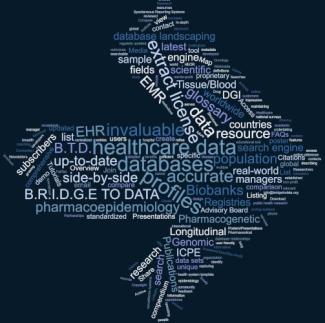We provide database landscaping services

We go beyond B.R.I.D.G.E. - Publications, web searches, our professional network, and KOLs.
Ask us for more information
Benefits
Valuable resource for research
Global
Comprehensive
Structured
Timely
Access a specialized glossary
Contact our staff
Scan recent publications & administrative contacts for each database
Archive searches & create your own database collections
Search & Compare standardized profiles side-by-side
Access most up-to-date profiles verified by database managers
Identify population healthcare databases worldwide
Key Database Features
Types of databases include:
- Longitudinal EMR and claims
- Drug or disease specific cohorts
- Registries
- National surveys
- National surveillance systems
- Spontaneous reporting systems
- Tissue/Blood
- Genomic/Pharmacogenetic
~500 standardized database profiles
135 defined data fields
Profiles from 73 countries
Regularly updated
What our customers say

The compendium maintained by BTD is a unique one with descriptions of databases from all over the world. Databases are described in a uniform way allowing fast comparison and selection of a database of interest. BTD also has contact details of individuals responsible for maintaining the database. It is user friendly and has video tutorials that provide a potential user with a short and comprehensive training on how to navigate through the profiles. Having access to ~500 descriptions of databases from all over the world saves time and money and allows a prompt identification of a suitable database.

B.R.I.D.G.E TO DATA (BTD) is the prevailing resource for capturing detailed global metadata on real-world databases. The developers of BTD have spent meticulous thought into creating a process for collecting (and maintaining) data by building relationships with key data vendors across the world. With the breadth and magnitude of global real-world data available, it’s a testament to the scientific staff at BTD to successfully achieve such an ambitious undertaking.

The B.R.I.D.G.E. TO DATA team did an excellent job for our organization profiling over 400 real-world databases and enabled us to identify a select few that best met our research criteria. We could not have done this work as effectively and efficiently on our own without BTD; the team was experienced and professional throughout the engagement. I highly recommend them for any organization needing to identify the best database for its research project.
What's new
In our latest newsletter we were thrilled to announce…
more »Our profile of Close Up’s Territorial Data (TD) (Market Sales Data Sub-National Level) for…
more »Close-Up: Territorial Data (TD) (Market Sales Data Sub-National Level) (Central America)…
more »We are delighted to announce the addition of The Swedish Dementia Registry (SveDem) …
more »






